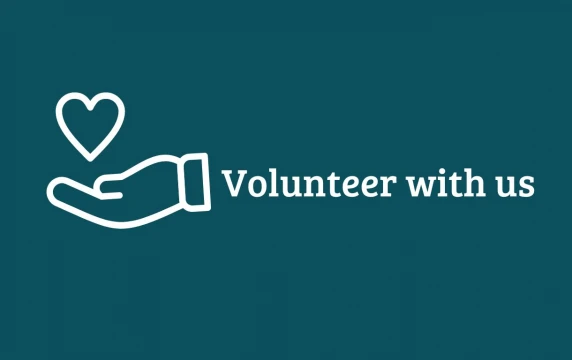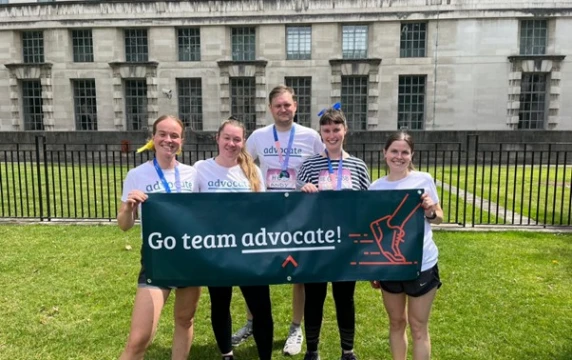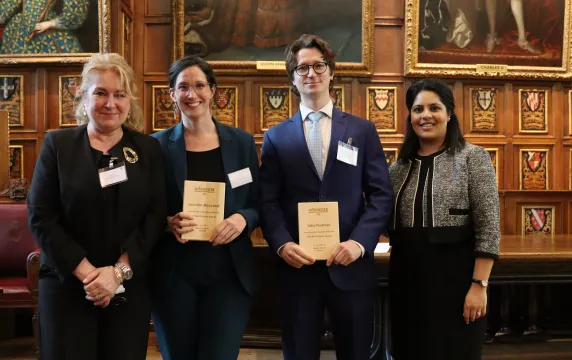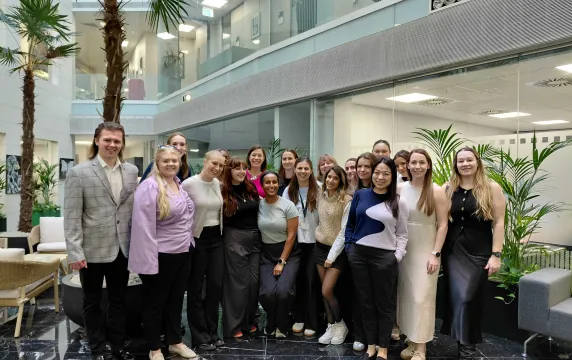“We have the capacity and the tools to change people’s lives for the better. It’s that simple.”

Samantha Hillas KC of St John’s Buildings in Manchester won the Pro Bono KC of the Year award in the 2024 Bar Pro Bono Awards. Samantha specialises in family law, and pro bono work has always been a central part of her practice. She has taken the time to share with us on the importance of what ‘accessing’ justice means to her, the rewards of helping pro bono clients, and how pro bono work even supported her application to take silk. She also talks about the support we have available through Advocate to help barristers make a difference, such as through our Collaborate mentoring scheme.
At what stage of your career did you take on your first pro bono case?
I cannot remember a time when I did not do pro bono work. As those who have followed my career will know, it took me a long time to secure pupillage, during which time I worked as a paralegal and requalified as a family law solicitor. Even back then, when legal aid was available for qualifying applicants in all family cases, there would be clients who for one reason or another did not qualify for legal aid but could not afford to pay private fees. Of course, since the virtual death of legal aid for family cases, there are now a great many more. Barristers and judges would, I think, be surprised by the amount of pro bono work that is undertaken by solicitors on a routine basis – not simply in terms of writing off bills at the end of a case or free initial appointments on a ‘sprat to catch a mackerel’ basis. I am lucky to have worked for firms who would allow me to take on pro bono cases with no hope or expectation of ever being paid for the work. Similarly, when in practice, I have been blessed to be a member of a Chambers which commits to undertaking pro bono work, so it has always been a part of my practice.
Why did you decide to undertake pro bono work?
I don’t wish to sound sanctimonious, but I don’t think of it as a choice, more an obligation, but one which I willingly discharge.
We don’t realise how privileged we are, even very junior members of the Bar, in terms of our access to information. We generally have superb clerks who provide administrative support. We have a whole stable of experienced practitioners on hand who will be only too happy to share their knowledge of the law and their experiences in court. Judges, court clerks, legal publications – they are all accessible to us and their details are at our fingertips. Whether we realise it or not, all that knowledge and access is power. In contrast, a litigant in person feels like they have no power at all. They have no administrative support (unless they are able to secure the services of Advocate or other pro bono schemes) to assist them. They have no idea how to construct a statement, respond to an offer, contact the court. If they are lucky, they can instruct lawyers to help them. If not, it is a daunting and extremely stressful process. Even if I don’t have the capacity to commit to running a pro bono case from start to finish, I’ve seen from my work with the Temple Law Centre that a 30-minute Zoom conference with a litigant in person - during which all you do is signpost them in the right direction and talk them through the process - will be incredibly valuable and will help them immeasurably.
What was the most memorable case you worked on, and what did you do?
There are so many to choose from. The thing with pro bono work is that the clients’ gratitude continues well beyond the end of the case. I still receive Christmas cards from pro bono clients from years ago and they keep me up to date with how their families are faring. It’s a wonderful feeling to hear that the child whose parents you have helped is living a happy and healthy life and that, in some way, you have contributed to that. I think if I had to choose, it would be a case I worked on prior to me taking silk and which has made me friends for life.
I was introduced by email to two sisters (one of whom herself was a criminal silk) by a solicitor friend of mine. They were navigating the family justice system on behalf of their other sister, who suffered from very serious health issues and communication difficulties. One of the two sisters was acting as a litigation friend in the financial remedy case. Although they had done all they could to resolve matters, they had reached a dead end, and it looked like a final hearing was on the cards within a few weeks.
The reality of what I did was, actually, very little. I contacted the barrister representing the husband and the court to confirm that I was assisting on a pro bono basis and to ask for more time. Both were very receptive to my involvement. I then assisted to negotiate a deal with which both parties were happy (and which enabled my client to keep her home), drafted a consent order, submitted it to the court and had it approved. The whole process probably took about three weeks. However, the impact on the client and her family was transformational. They could put the difficult proceedings behind them and focus on the (much more important) health issues suffered by my client. She could relax, knowing she would not have to leave her home. I think the case is so memorable because those two sisters have become very, very good friends and two of my biggest champions. Even after their sister’s death, they never let me forget the relief they felt when I came on board and helped them sort something that was causing an enormous amount of stress for the family and I am forever grateful for their friendship. That case was genuinely a two-way street.
What effect did pro bono work have on your career?
One of the twelve cases I used in my silk application was a pro bono case and was a perfect showcase for some of the competencies you have to demonstrate. The fact you are committed to pro bono work means that, immediately, clients and instructing solicitors know that making ‘a quick buck’ is not your only motivation. That is really important when we supposedly ‘fat cat lawyers’ receive such a bad rap in the media.
What is the most rewarding thing about doing pro bono work?
We have the capacity and the tools to change people’s lives for the better. It’s that simple.
What advice would you give to any barrister unsure about whether to start doing pro bono work?
Do it! Trust me – the satisfaction you will feel after your first pro bono case will far, far outweigh the time spent on it.
If you are worried about taking on a case, ask for help. Advocate have a brilliant mentoring scheme which matches the advocate with a senior member of the Bar who will be on hand to consult with about the case and discuss any tricky issues. That in itself will expand your professional network and make the case a real learning experience.
Let me give you an example. The first contested case undertaken recently by a second six pupil in my Chambers was a pro bono, two-day final financial remedy hearing via Advocate. He will tell you it was a real baptism of fire, but he had every resource available to him. He had an excellent caseworker at Advocate who put the papers together. He had me and other senior members of Chambers to help him with his skeleton argument, who discussed the evidence, case theory and lines of cross examination with him and who helped him with drafting the final order at the conclusion of the case.
It was an incredible experience for him and the icing on the cake was that the client got a good result. It is unlikely, given his level of call, that he would have been given that level of responsibility at such an early stage of his career, but I like to think it has given him a truly outstanding ‘leg up’ in his fledgling career as a family barrister.
I asked him for a ‘sound bite’ about what the case meant to him, and I will leave you with what he said as the final message, as it encapsulates brilliantly in one sentence all I have tried to convey above:
“The benefit of pro-bono work cuts both ways, helping both the client and me. Having a grateful client is not always guaranteed normally, so having someone who is happy and engaged when giving instructions reminds me this job is ultimately about helping people. As a student I had a notion of the law being equal to all, but this something I am coming to terms with not always being the case. Being able to help people who really need it, but fall in the enormous gap between legal aid and actually affording my fee, is something I think is important and I want to incorporate into my practice going forward. It also means I can build a reputation and experience in areas of work that I otherwise would not be able to at this stage of my career.”
Do you feel inspired to take on pro bono work?
Find out more about taking on pro bono work with Advocate and see our How to volunteer with Advocate guide.
Read our Guide for KC applications to learn how pro bono work can assist when applying for silk.







